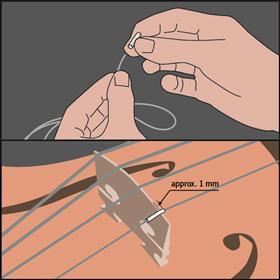kissing
Well-known member
- Joined
- Mar 30, 2009
- Messages
- 4,364
- Reaction score
- 596
UPDATE
The 2.0mm string worked, but required some major modifications to the instrument to accommodate the thick string.
But at least I've shown that it is possible in concept. A heavy gauge fluorocarbon string could potentially work better without being as thick.
Video demonstration:
__________________________________________________
I have not been able to find a commercially available unwound low-D string that would work on a tenor ukulele.
Wound A string of a classical guitar works perfectly in general, but I have a Risa tenor Uke-Solid which has an unconventionally shaped plastic saddle that gets chewed up by wound strings.
Thus I would prefer having an unwound low-D string for Tenor (I tune it to DGBE like a baritone ukulele).
Options I have tried so far:
-PhD unwound low-D for baritone ukulele
Too loose on a tenor scale. Might as well use it as a low-G string.
-Classical guitar wound A string with rubber tubing where it meets the saddle in an attempt to protect the saddle (sometimes this is done on violin). Unfortunately the wound string chewed through the rubber tubing.

The thickest commercially available nylon string I can find is La Bella 0.045 (1.14mm) which is on the way to me from StringsByMail, but something tells me that even this won't be thick/hard enough to maintain low-D on a tenor. Thus I have taken matters into my own hands by ordering 4 different thick nylon fishing lines as listed below. While I wait for them to come, I thought it might be a fun exercise to see which one is the most popular choice that people expect to work. It's going to be a fun case of trial and error.
Yes, I'm aware that having an unwound low-D is not ideal on a Tenor ukulele's scale. But this is an entirely electric instrument where acoustic volume is not an issue and I'm willing to make a bit of compromise if I can get an unwound string that feels ok to play at an appropriate tension.
Links to fishing lines I ordered:
1.0mm

1.4mm

1.75mm

2.0mm

Other options being considered if unwound string is unsuccessful:
-Replace plastic saddle with a custom brass one, or possibly bone.
Might be challenging to get the dimensions exactly right. But do-able. Would like to avoid the extra complexity and manual labor (lots of sanding) if possible.
-Flatwound classical A string with rubber tubing in an attempt to protect the saddle.
Perhaps being flatwound will make it less likely to chew through the rubber tubing.
The 2.0mm string worked, but required some major modifications to the instrument to accommodate the thick string.
But at least I've shown that it is possible in concept. A heavy gauge fluorocarbon string could potentially work better without being as thick.
Video demonstration:
__________________________________________________
I have not been able to find a commercially available unwound low-D string that would work on a tenor ukulele.
Wound A string of a classical guitar works perfectly in general, but I have a Risa tenor Uke-Solid which has an unconventionally shaped plastic saddle that gets chewed up by wound strings.
Thus I would prefer having an unwound low-D string for Tenor (I tune it to DGBE like a baritone ukulele).
Options I have tried so far:
-PhD unwound low-D for baritone ukulele
Too loose on a tenor scale. Might as well use it as a low-G string.
-Classical guitar wound A string with rubber tubing where it meets the saddle in an attempt to protect the saddle (sometimes this is done on violin). Unfortunately the wound string chewed through the rubber tubing.

The thickest commercially available nylon string I can find is La Bella 0.045 (1.14mm) which is on the way to me from StringsByMail, but something tells me that even this won't be thick/hard enough to maintain low-D on a tenor. Thus I have taken matters into my own hands by ordering 4 different thick nylon fishing lines as listed below. While I wait for them to come, I thought it might be a fun exercise to see which one is the most popular choice that people expect to work. It's going to be a fun case of trial and error.
Yes, I'm aware that having an unwound low-D is not ideal on a Tenor ukulele's scale. But this is an entirely electric instrument where acoustic volume is not an issue and I'm willing to make a bit of compromise if I can get an unwound string that feels ok to play at an appropriate tension.
Links to fishing lines I ordered:
1.0mm

DFS MONO CLEAR NYLON FISHING TRACE LEADER 80LB 100m HANK, tackle | eBay
100m hank 80LB TEST. KOREAN MANUFACTURE.
www.ebay.com.au
1.4mm

DFS MONO CLEAR NYLON TRACE LEADER 150LB 100m HANK | eBay
100m hank 150LB TEST. KOREAN MANUFACTURE.
www.ebay.com.au
1.75mm

100m 200LB DFS MONO CLEAR NYLON FISHING TRACE LEADER 100m HANK, 1.75mm Dia | eBay
DFS QUALITY AND LOW PRICES. 100m hank 200LB TEST. KOREAN MANUFACTURE.
www.ebay.com.au
2.0mm

100m 250LB DFS MONO CLEAR NYLON FISHING TRACE LEADER 100m HANK, 2.00mm Dia | eBay
100m hanks 250LB TEST. DFS QUALITY AND LOW PRICES. KOREAN MANUFACTURE.
www.ebay.com.au
Other options being considered if unwound string is unsuccessful:
-Replace plastic saddle with a custom brass one, or possibly bone.
Might be challenging to get the dimensions exactly right. But do-able. Would like to avoid the extra complexity and manual labor (lots of sanding) if possible.
-Flatwound classical A string with rubber tubing in an attempt to protect the saddle.
Perhaps being flatwound will make it less likely to chew through the rubber tubing.
Last edited:


